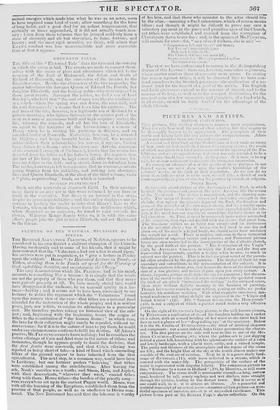13 OSWORTH FIELD.
T1IE title of this "Historical Tale " fixes the time and the country in V. hich the scene is laid. The events are made to connect them- selves with the series of plots and adventures which led to the invasion or the Earl of Richmond, the defeat and death of Millard at Bosworth, and the succession of the invader to the English crown. Besides the characters of the two monarehs, the
an introduces the dowager Queen of Edward the Fourth, her daughter Elizabeth, mid the leadieg nobles who were engage I in those great events. Amongst the noldes, we Eel a se!, of Lied 8f:whey's, who held that " the soul of nem ivas like the v. haling- t: p if a watch—when the spring was run dawn, the man died, and the soul determined ;" it dogma that leses hint his mistress. The real hero of the tale, however, is a legitimate son of Richard by a private marriage, who figures; throughout the greater it of the story as a man of mysterious birth and high emprize: saving the life, winning the regards, and all but the love of Elizabeth; an agent in the intrigues of the Lancastrians; a comate of 'Beery when be is visiting his partisans in disgui-ae and an hateloled leader at Bosworth. Uttleekily, honeiver, he is arrested by Diehl on ; and being brought befure Richard, the monarch acktiO'.% ledges their relationship: his nerves, it appears, ha vine- Leca. idetken by a dream—after StelKSPEARE. Ai wydo, conscious of the concealed streneth of l!iehmetel, knows that the crown has departed from his Ether and his fa thee's house. lie reque-ds that the fact of his birth may be kept secret till after the runion ; fol- lows his lather to the field; and is struck down in defending him. The reader, however, is left to conjecture that he recovers, eouverts young Stanley front his inlidehty, and retiring into obscurity, dies: and Queen Elizabeth, at the close of the third volume, visits a " plain, unpretending " tomb, on which is inscribed RICHARD PLANTAGENET !
Sueli are the materials of Posworth 1iId. In their arrange- ment there is no art.; nor is this want redeemed by any force or truth in the ceecutien. But tine:e is an interest in flee story, despite its gross improbabilitiee; and the author displays s.ane in- !zciiiiity in leading the reader to infer that Henry s bate to the Vorhists, when on the throne, arose from the indifference which, when disguised as an emissary, he lotted to exist towetds his claims. Whoever Rouge Espoir talks to, it is with the same cifect ; people join the plot to rabJe Elizabeth, and not Richniond to the throne.


























 Previous page
Previous page